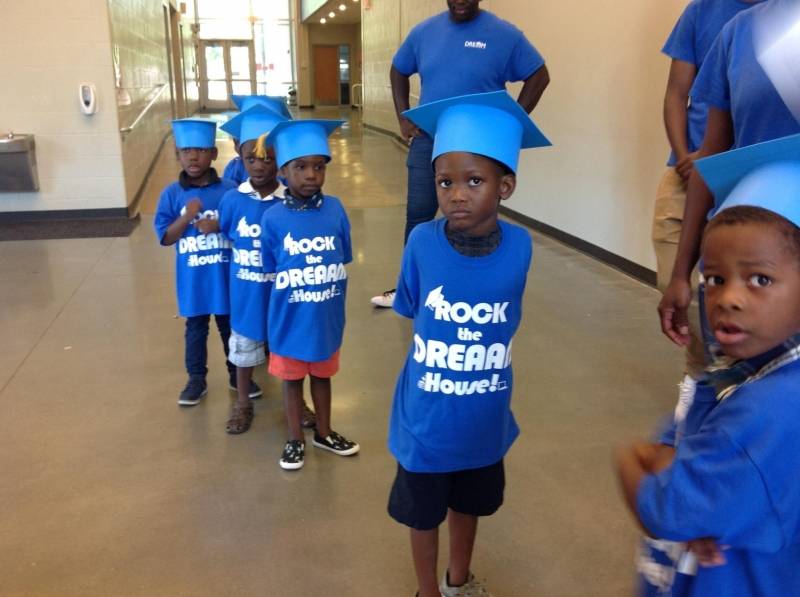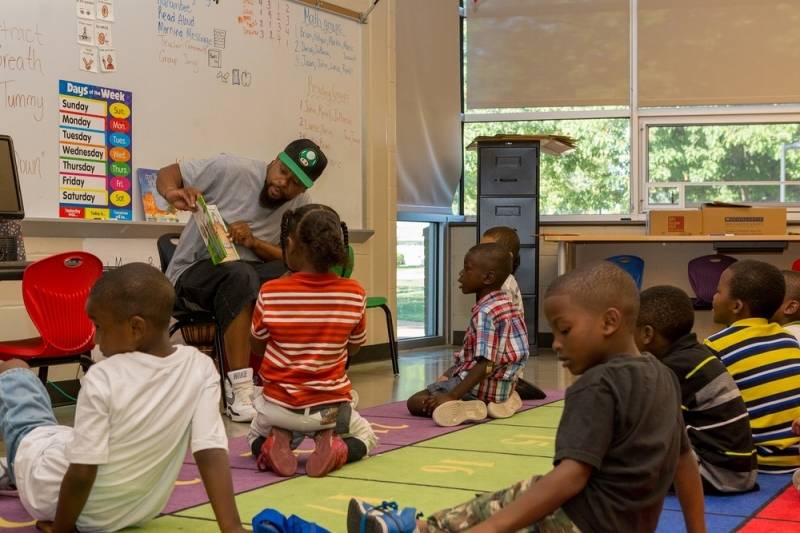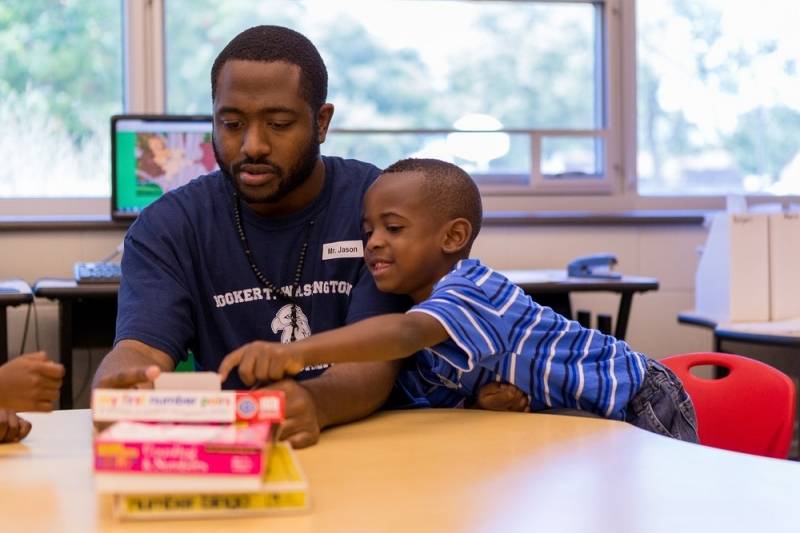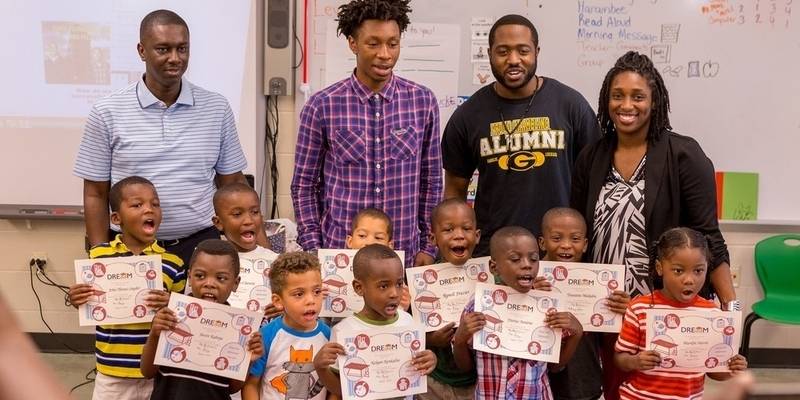This summer I stumbled upon some adorable pictures of young kids in bright blue graduation caps on the Champaign Unit 4 Facebook page. It turns out these tiny graduates were celebrating the completion of the DREAAM House Pre-K summer program. And no, that’s not a typo. DREAAM stands for Driven to Reach Academic Achievement for Males. DREAAM House partners with local schools to provide academic and social development for youngsters in our community, more specifically African-American boys. The program was founded by Tracy Dace with the support of his congregation at First Presbyterian Church of Champaign. Dace is originally from Mississippi and came to Champaign-Urbana in 2007 to pursue a doctorate in special education. While he didn’t finish, he has used what learned from his studies to support youth and education in our community. He’s worked with kids from Don Moyers Boys and Girls Club as well as those who have spent time in the juvenile detention center. He’s tutored in the AVID program, and has been an instructor at Parkland. As Dace says, it was a “rich ground of experiences to think about what we can do to advance an agenda for boys.” I spoke with Dace a couple of weeks ago to find out more about DREAAM House and his vision for the program’s future.

Smile Politely: What inspired you to pilot a program like this? Why the focus on African American youth, and specifically boys?
Tracy Dace: Through my professional work I’ve had an opportunity to connect and build relationships and learn from and with boys, to see them have successes and struggles, and to know that there wasn’t a space for them to explore their identity. I wanted to create opportunities for them to understand that they are great in so many ways. Engaging with boys impacted by and involved in the juvenile justice system, seeing them wanting to change and improve their life opportunities and not necessarily know how, I wanted to connect them with something in order to help guide them in that direction. I started to think about what that might look like, and how we could create something that is seamless, starting with boys at the earliest age possible and build a set of supports…a pipeline that’s there to walk alongside them through 12th grade.
SP: I know that right now you’re really focused on Pre-K…how important is it to start that trajectory so early?
Dace: It wasn’t until I started working at Parkland that realized how important it is to start as early as possible, starting on two key components: academic development and social/emotional development. I think when you have been able to reach the college level, even if you are not completely academically prepared, if you have the grit, that social/emotional development and competence, then you have a very strong tool to help you with the academics. It’s really critical to our young people that we pay more attention to early childhood years so that they are more set up for success. So DREAAM House is really about how do we support schools in reducing the achievement gap among boys, with a targeted focus on African American boys.
SP: Tell me a little bit more about the programming that you do at Dreaam House.
Dace: We use positive youth development research to create a program that tries to get us in these boys’ lives 3-5 times per week. We know that we want to have a year round impact, make sure families are included, and we want the work to respond to their culture. Right now DREAMM House has five core components. First is a summer jump-start experience, where boys are exposed to the upcoming curriculum for the next year. Then we transition to an after school program. This year we’ve been able to expand, so the kindergarten boys are in a two day a week after school program, but the 1st through 5th grade boys we’ve expanded to a five day a week program. We also provide Saturday engagement opportunities like camping and sports. We provide school based mentoring for kindergarten and 1st grade, and then we have a family component. We work with families on engagement activities. This summer we did a DREAAM family vacation. It was an overnight mini-vacation that 55 people attended. We chartered a bus to St. Louis and went to the City Museum, the zoo, stayed overnight…creating those memories is so important.

SP: So do you have a facility that the kids come to or do you go into the schools?
Dace: We are school based, which helps us to have a cost-effective program. And the schools in Unit 4 and Rantoul have been tremendous partners, providing that in-kind support so that we can do this work with our kiddos. When I started this work I wanted to have low overhead, with more of the resources going directly to the families. We’ve done a lot of programming on a tight, shoestring budget because of the partnerships we’ve had with schools and other entities, not having to worry about rent.
SP: You are a fairly young program, what kind of results have you seen in the short time you’ve been operating?
Dace: We’ve prepared around 51 boys for kindergarten in the Champaign and Urbana areas. As a new program we haven’t had much opportunity to prepare systematic data, but I can tell you we’ve had high retention. Once boys enter in the program they stay, which is very promising. We have very high parent support, and it can be a challenge to get parents, particularly black parents, to be involved. Overall anecdotally the boys are doing well in school, and they love the DREAAM House. When you think about essential skills that kids need, one of those is belonging. That’s why I really want to be positioned in schools because we hope that the connection to DREAAM House carries over to making a connection in school.
SP: What’s your vision for the future of DREAAM House?
Dace: I hope to see a sustainable program, in that we have the funding to do the work. I anticipate that we will have clearer evaluation outcomes that we can use to share the story with the community. I see being able to have the resources to establish an early childhood learning center with therapeutic components to it. And overall I really envision some social change around the future of our kids. To instill more hope in families about our boys and their bright futures, that we collectively create that environment for them to grow and thrive.

SP: Who staffs your program? Are you primarily volunteer?
Dace: It’s a mixture. We’re fortunate that we have some certified teachers through different grants, so the boys are really getting a very quality experience. But we also have a very strong group of volunteers…from retired teachers to college students…it’s a really dynamic “dream” team.
SP: So what can the community do to support the work that you’re doing?
Dace: There’s always opportunities for more volunteers, we really try to have a small adult to child ratio. And as we move to this five day a week program, one of our goals is to increase homework completion, so volunteers can support that. Being a mentor is a huge need. As we build a sustainable model, definitely there is a need for funding and private donations are always welcome. Also I believe in having “thought partners.” This work is so critical and it can’t all rest on my shoulders, it has to rest among the village of people…people with very specific skills that could work alongside me and the board of directors in developing some tangible ways of doing this work.
SP: Anything else you want to share about Dreaam House?
Dace: Well we have a code of honor that we use with the boys. DREAAM boys are leaders, DREAAM boys are respectful, DREAAM boys use nice words, DREAAM boys work hard, and DREAAM boys are positive brothers. We really push this concept that thought we are not connected biologically, you do have this cultural, moral responsibility to support each other and appreciate each other and help each other be positive in the community, at home, and at school. It’s amazing the counter space that we are creating. These boys really connect and appreciate it.
SP: You know you’re really fulfilling a need.
Dace: We’re all about counter narratives. There’s a lot of talk about the school to prison pipeline, and what we’re trying to create is a school to college pipeline. There’s a lot of research about how boys join gangs for the sense of belonging and connection and extended family. So why not create a positive “gang” or space. So it’s really taking all of this research around negative outcomes and flipping it to create positive outcomes. We’re trying to change the game for boys.
To find out more about DREAAM House and their game changing program, you can visit their website or check out this video highlighting the impact that this important program is making on kids in our community and their families.








